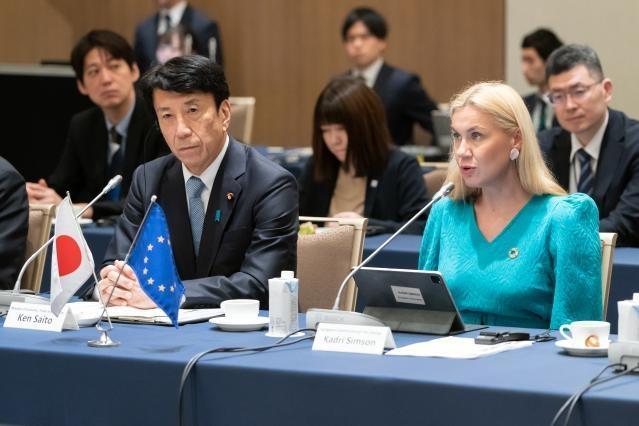On June 3, the Minister of Economy, Trade and Industry Ken Saito and the European Commissioner for Energy, Kadri Simson, held a High-Level Hydrogen Business Forum (the “Forum”) to deepen their cooperation regarding hydrogen business and technology development in the framework of the EU-Japan Memorandum of Cooperation on Hydrogen signed in December 2022 (the “MoC”) and the Japan-EU Summit Meeting of July 2023.
The MoC is a concrete illustration of the Green Alliance agreed by the leaders of Japan and the EU in May 2021 which is intended to build cooperation in areas and technologies necessary to reach carbon neutrality. Furthermore, recognizing the need to address systemic vulnerabilities, stemming from economic dependencies on certain supply sources and overcapacities, and to promote level-playing field through coordinated efforts, they have expressed shared view at the 5th Japan-EU High-Level Economic Dialogue held on May 2nd.
Minister Ken Saito and Commissioner Kadri Simson agreed on the following points:
1. They shared deep concerns about economic dependence on specific sources of supply for strategic goods due to a wide range of non-market policies and practices, such as market-distorting industrial subsidies, and its weaponization which were discussed at the 5th Japan-EU High-Level Economic Dialogue. They recognize the need to address the systemic vulnerabilities stemming from economic dependencies on certain supply sources and overcapacities, and to promote a level playing field through coordinated efforts.
2. They agreed to cooperate on supply and demand-side policies in clean energy sectors, and to properly evaluate non-price elements such as principles of transparency, diversity, safety, sustainability and reliability. They confirmed that work will begin in the fields of wind, solar and hydrogen, with plans to expand in the future.
3. They agreed on the importance of working with like-minded partners to build and strengthen transparent, resilient and sustainable supply chains as widely as possible, and agreed to establish a working group on Japan-EU Clean Energy Industrial Policy Coordination to carry out the work mentioned above.
4. They reiterated their strong common interest in supporting investment and deployment of renewable and low-carbon hydrogen. They recalled that the Forum is part of the implementation of the MoC; The Forum discussed industrial cooperation, finance and supporting measures, and research and development, with the participation of Japanese and EU energy industry top executives. The outcome of this Forum will be reported to both EU and Japanese leaders before the next Japan-EU Summit.
5. In order to promote business cooperation between Japan and the EU, the Forum provided an opportunity for presentations from participants and business matching. Some cooperation documents were signed to promote collaboration between various actors in the hydrogen field:
(1) Japan Hydrogen Association (JH2A) and Hydrogen Europe
(2) New Energy and Industrial Technology Development Organization (NEDO) and Clean Hydrogen Joint Undertaking (CHJU)
(3) Japan Organization for Metals and Energy Security (JOGMEC) and H2GLOBAL
(4) Japan Hydrogen Association (JH2A) and H2GLOBAL
(5) Kawasaki Heavy Industry and Daimler
Further, they welcomed that The High Pressure Gas Safety Institute of Japan (KHK) and Joint Research Center (JRC) intend to deepen the cooperation in hydrogen safety.
6. As a next step, they will work to formulate a joint working plan to continue deepening the cooperation in the hydrogen field. Especially, based on the recent policy developments regarding hydrogen both in Japan and the EU, which include supporting schemes established by the Hydrogen Society Promotion Act in Japan and the European Hydrogen Bank in the EU. They will exchange information on the functioning and participation requirements under the two schemes, keeping in mind the importance of building a resilient and sustainable supply chain. Likewise, further information exchange will be undertaken concerning the standardisation work on hydrogen (e.g. electrolysers, large-scale liquefied hydrogen tanks, refueling infrastructure for heavy duty vehicles) and regulatory requirements concerning the secure and rules-based international trade of renewable and low carbon hydrogen.

